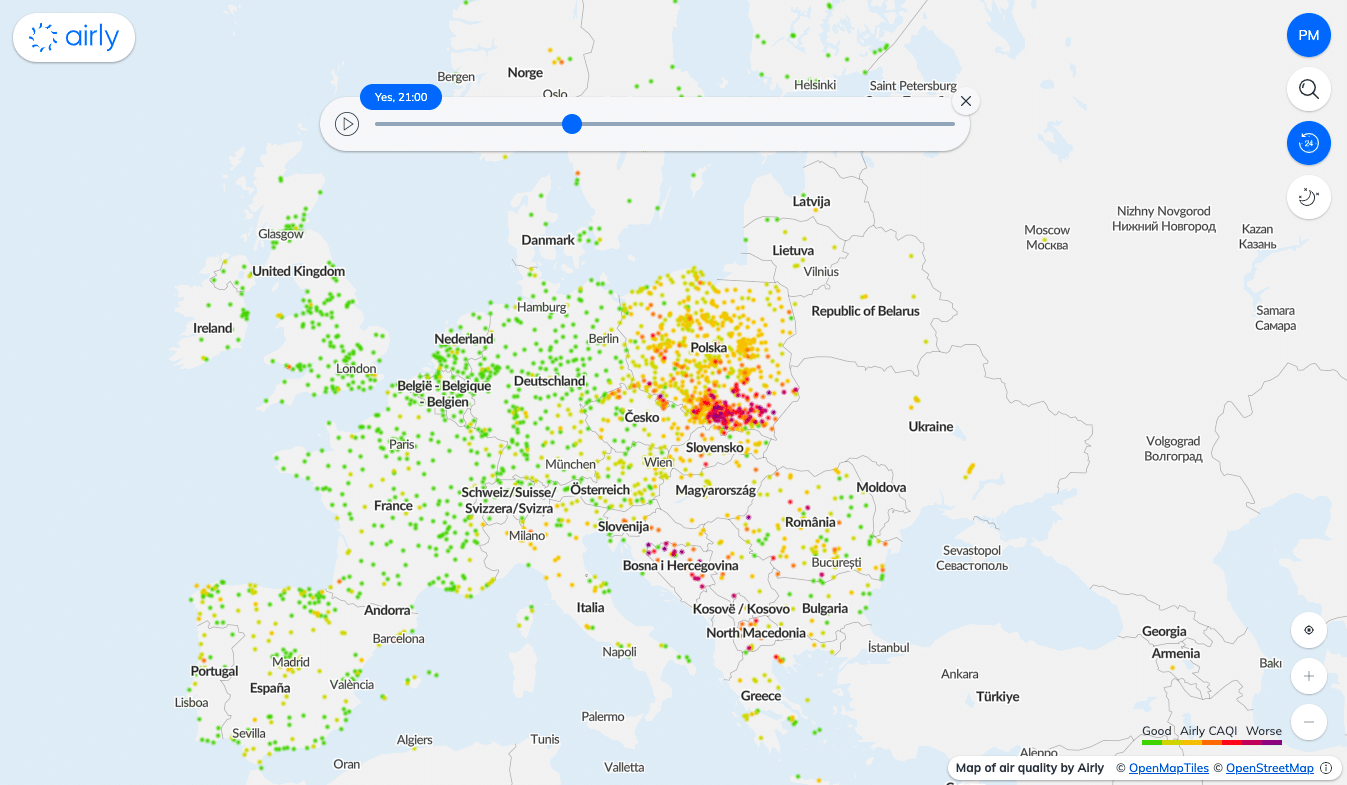Guest article by Anna Kotarska, Project Manager, Polish Society for Health Programs (PTPZ)
Zdrowe Powietrze | Facebook
Love autumn? Take a deep breath.
In Poland, together with the beauty of autumnal golden leaves, the heating season has brought the old problem of air pollution to light once again. Don’t be misled, however, by the joyful colours in the map – they are grim evidence of how much still has to be done to enjoy the next seasons fully and in good health.

Figure 1. Screenshot from Airly app for 27 October 2021
Sitting by the cozy fire-place
Despite a decrease of about 18% (compared to 2014) in the number of boilers, coal-fired boilers still remain the main source of home heating, particularly in rural areas. Heating installations in Poland utilizing gas or wood, which also are fuels that emit significant amounts of pollutants to the environment, are only slightly less popular. An additional difficulty in curbing the emissions results from the outdated construction of the houses. Since approximately 33% of houses have no insulation, the more intensive use of heating installations is the only way to keep rooms warm in winter. It is estimated that the problem of energy poverty affects up to 10% of citizens.
Does the Government help?
The actions taken at both the national and regional levels in the last few years, linked to the implementation of the Ecodesign requirements, may foster some optimism. Solid fuel heaters, i.e. fireplaces and cookers, from the beginning of 2022 will have to meet the Directive requirements specifying combustion emissions limit values for PM, OGC, CO, and NO. To this end, the provincial assemblies (Sejmik województwa) may adopt so-called “anti-smog resolutions” – local acts of law which regulate burning of which types of solid fuels is banned in a given area, as well as the technical requirements for boilers and space heaters in use. The legal bases for these resolutions are the national acts of law – the Act of 5 June 1998 on provincial self-government (2018) and the Act of 27 April 2001 Environmental Protection Law (2018).
Is the wind of change blowing in the right direction?
Currently, 14 out of 16 Polish voivodeships have adopted anti-smog resolutions that differ in the scope and obligations they impose. Moreover, community awareness of their existence is relatively low. At the same time, the control and enforcement of the resolutions seem to be problematic on the part of the provincial governments. Few of them provide inspection reports, which makes it difficult to access information on the effectiveness of these regulations. Lack of common policy is yet another pitfall. The solutions proposed so far do not stimulate the implementation of modern technologies, which makes it impossible to achieve desired health and environmental goals in the long term.
Shrouded in the mist
According to estimates, in order to meet the objectives of all the resolutions currently binding in Poland, it is necessary to replace annually nearly 425 k installations. As the analysis show, the pace is too slow and, most likely, the target will not be reached in the near future leaving Poles shrouded in the choking mist for yet another season.
The above highlights come from the report Anti-smog resolutions of provincial self-governments as a tool for improving air quality. Preliminary review of solutions prepared by the Polish Society for Health Programs and including selected sections in English. A national conference is planned for 4Q2021 to present the main findings of the report, discuss Polish climate policy and its impact on air quality, as well as to propose solutions that can have a real impact.
Disclaimer: the opinions – including possible policy recommendations – expressed in the article are those of the author and do not necessarily represent the views or opinions of EPHA. The mere appearance of the articles on the EPHA website does not mean an endorsement by EPHA.

